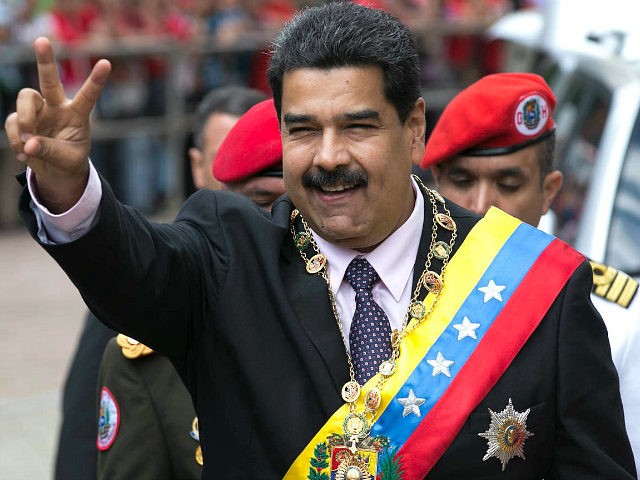Socialist International has issued a statement condemning the socialist government of Venezuela for keeping political prisoners, collapsing the nation’s economy, and generally “reflect[ing] the characteristics of a failed state.”
The scathing new missive begins by observing that “the political, social and economic situation in Venezuela is becoming increasingly serious and urgent for millions of its inhabitants,” and it warns that Venezuelans can no longer “rely on the protection of the institutions which do not respond to the many emergencies that afflict the Venezuelan people and which reflect the characteristics of a failed state.”
In particular, the statement condemns the arrests of opposition members whose parties are members of the Socialist International and demands “the liberation of all political prisoners, the recognition of the sovereignty of the National Assembly, appropriate responses to the humanitarian crisis and the establishment of an electoral timetable.”
The letter also warns that Maduro’s regime appears to be taking a “growing turn towards authoritarianism” and warns of the precipitous decline in the nation’s economic state.
Socialist International is a coalition of political parties around the world that subscribe to socialist political ideals. Four parties in Venezuela — Democratic Action (AD), Movement for Socialism (MAS), A New Era (UNT), and Popular Will (VP) — are members of Socialist International. The ruling United Socialist Party of Venezuela (PSUV) is not. Three of the four parties are members of the Democratic Unity Roundtable (MUD), the opposition coalition currently governing the Venezuelan National Assembly.
Leopoldo López, the leader of Popular Will, was arrested in February 2014 and sentenced to 13 years in prison for organizing a peaceful protest against Maduro.
This is not the first time Socialist International has criticized Maduro. The group celebrated the PSUV’s defeat in the 2015 legislative elections and condemned Maduro for overriding the National Assembly’s power using the court system shortly thereafter. Maduro, the group protested, “has distanced Venezuela from the democratic and institutional order required by its constitution and from the clear and legitimate mandate granted by the people at the elections last December” by attempting to dissolve the legislature.
Socialist International even criticized Maduro’s predecessor, the socialist icon Hugo Chávez. “The Socialist International has learnt with concern of the decision by administrative authorities of the Bolivarian Republic of Venezuela, without any due process or sentencing, to deny over 400 citizens the right to stand as candidates in the forthcoming regional and local elections on 23 November this year,” the group wrote in 2008, calling for Chávez to respect the nation’s constitution.
Both international socialists and domestic Chavistas have turned on Maduro after over three years of gross mismanagement of the Venezuelan economy and oppression of political opponents. In a watershed moment last year, a group of Venezuelan socialist military officers who had helped Chávez stage a failed coup in 1992 published a letter condemning Maduro for abandoning Chávez-style socialism to impose his own autocracy.
“You and your government, Mr. Maduro, should once and for all speak clearly to the nation and abandon your cynicism, telling us what we all know: that this is not Revolution, nor socialism, nor much less does it have anything to do with Bolivarian ideals,” the letter read. The generals later supported an attempt to recall Maduro and force a presidential election, which Maduro unconstitutionally quashed.
Before the generals’ announcement, a group of former ministers under Chávez not only turned on Maduro but accused him and his underlings of extreme corruption. Former ministers Héctor Navarro and Jorge Giordani accused Maduro’s officials of stealing over $300 billion from the government’s state-owned oil corporation, noting that public finance documents do not account for those funds. In a separate investigation, former Chavista minister Ana Elisa Osorio found that state accounting appeared to be missing $20 billion.
Individuals outside of the government who had supported Chávez have also turned on Maduro publicly. In a column on the anti-Maduro site “Maduradas,” a former supporter of Chávez wrote that she was extremely grateful for her free education under the socialist system. “It hurts for me to know, however, that my son, who also attended my school two years ago, is no longer with me today because he was robbed and shot in the face while walking out of class on a Thursday afternoon.” The writer blames Maduro for the astronomical rise of violent crime in the nation in the last three years. Caracas is considered the world’s most dangerous city.
Another former Chavista, sporting a tattoo of the late dictator on his back, criticized Maduro in a video that went viral in April 2016. “We were Chavistas,” he says, showing his tattoo after fighting a mob for a bag of onions. “Us Venezuelans are killing each other over a piece of food.”
Maduro has attempted to keep his popularity from total collapse by repeatedly raising the minimum wage. Last week, he announced the minimum wage would rise 50 percent by decree, bringing it to $12.14 a month, a $0.13 cent increase. That increase followed a 40 percent raise four months earlier.

COMMENTS
Please let us know if you're having issues with commenting.